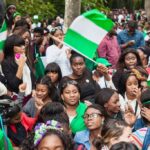The Emir of Jiwa, His royal highness, Dr. Idris Musa MFR, has called on the younger generation to embrace their heritage and actively participate in the revival of cultural traditions.
Speaking in an exclusive interview to celebrate this year’s Jiwa International Festival of Arts and Culture, known as Gani festival, the Emir emphasized the importance of continuity in preserving the community’s rich legacy.
“Our appeal to the youth is to join us and learn,” the Emir urged. “By understanding our history and culture, they can pass it on to their own children, ensuring our legacy endures. This festival is not just a celebration; it is a way to connect with our roots and uphold the values that define us.”
The festival, which promises to be a vibrant showcase of history, culture and unity, comes as Jiwa renews its commitment to its age-old traditions and the unity of its diverse people.
- Chinese drilling team turns Egypt’s desert into farmland
- How INEC can consolidate off-season election gains, by experts
Tracing back to the history of its migration from Zaria in the 15th century, the Emir said as part of the southern Zazzau region, Jiwa initially fell under the governance of the Zazzau chiefdom. “Before Abuja, Jiwa was part of Zazzau, and even before the jihadists of Usman Dan Fodio emerged, Jiwa was one of the vassal states under Zazzau,” the Emir explained.
According to the Emir, their movements and subsequent developments led to the establishment of the Abuja Emirate in 1825.
“Our first settlement was at what is now referred to as Obasanjo Mountain,” the Emir recounted. “There, you will find the graves of six of our chiefs. This was the foundation of what Jiwa is today.”
From its origins to its inclusion in the Federal Capital Territory in 1976, Jiwa has remained a pivotal community, embodying resilience and adaptation amidst change.
Central to Jiwa’s historical and cultural narrative is the role of women, whom the Emir described as the foundation of society. “Women are number one because they are mothers, caretakers and role models,” he said.
Jiwa women have long been involved in economic activities such as weaving, farming, and trading. They have contributed significantly to the community’s development, trading in goods such as guinea corn, beans and locust beans. The Emir’s personal anecdotes of his family’s trading endeavours underscored the entrepreneurial spirit of Jiwa people.
“My dad was a trader; he traded from here down to Umuahia,” he said
While trade thrives, agriculture remains a vital part of Jiwa’s economy. The community’s farmers cultivate the fertile lands that have sustained them for generations.
“Our people are predominantly farmers and traders,” the Emir noted. “This dual economic pursuit has kept Jiwa vibrant and self-reliant.”
This year’s celebration
At the heart of the festivals celebrated by the Jiwa community, Gani celebration is the historical event that marks the end of the year. Once a seven-day affair, the Gani festival brought together people from various villages to celebrate unity and cultural pride.
“The Gani festival was a significant event for our ancestors,” the Emir said. “Though it diminished over time, we have revived it to ensure that our traditions are not lost to history.”
The festival will feature a blend of ancient and modern regalia, traditional dances and cultural performances, offering attendees a glimpse of Jiwa’s vibrant heritage.
The Jiwa International Festival of Arts and Culture is more than a celebration of local traditions; it is a symbol of the unity and harmony that define Jiwa. The Emir emphasized that the festival is a platform for diverse tribes and ethnic groups to come together.
“This is a forum for unity,” he said. “In the olden days, people from neighbouring villages joined us to celebrate. Today, the same spirit persists, with Yorubas, Igbos and Fulanis participating alongside our own people.”
The festival’s inclusive nature highlights Jiwa’s role as a melting pot of cultures, particularly within the Federal Capital Territory.
The Emir sees the festival as an opportunity to inspire the youth and foster a deeper appreciation for their heritage. “This is a chance for our younger generation to learn and carry forward our traditions,” he said. “It is not about religion; it is about showcasing our culture and unity.”
By involving the youth, the Emir hopes to ensure that the festival’s legacy endures, keeping Jiwa’s cultural identity alive for future generations.
The Jiwa International Festival of Arts and Culture, celebrates the community’s storied past and its aspirations for the future. The Emir’s vision is clear: a festival that unites, educates and celebrates.
“This is a festival that you watch and love,” the Emir noted. “It is our way of preserving and sharing our heritage with the world. Let us come together to celebrate what makes Jiwa unique.”
With its rich history, culture and unity, the festival is poised to be a defining moment for the Jiwa community and a symbol of inspiration for others.

 Join Daily Trust WhatsApp Community For Quick Access To News and Happenings Around You.
Join Daily Trust WhatsApp Community For Quick Access To News and Happenings Around You.

